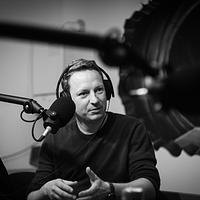After one year of war, Ukraine as a country is torn between resilience and devastation. But what did the war do to Ukrainian students at Saxion? How are they doing? How did one year of war change them? And (how) do they keep hope? Three portraits. Third is Oleksandr Kuprii (19), 2nd year student Applied Computer Sciences. "We see that we are not left alone."
Things are going okay for Oleksandr Kuprii, he says. Not least because he is on a train. On his way to Poland, where he has arranged to meet his mother. "I'm looking forward to seeing her," he says. The last time was in October, when he could show her Enschede. "I am okay, also because I know my parents are doing well. It differs from when the war started, when contact was difficult, now I see my parents online almost every day."
He doesn't see himself as a victim of the war so much, others are going through tougher times, it comes back expressed and unspoken time and again. It may also help that the war is mainly something he follows through his screen, he says. "I can also imagine that you hear different things from fellow students who have gone back. They have seen first-hand the bombings, the devastation, were in the bomb shelter. It's very different."
Distinction
How the war changed him? That's a tricky one, he says philosophically, because you are constantly changing. It is difficult for him to distinguish between his development as a 'normal' 19-year-old, and as a 19-year-old dealing with war in his homeland. "But obviously I had to deal with the war. I think the whole situation made me more prepared. Stronger too."
He focuses on his studies, and his work. "And I know my parents are safe. At the same time: the whole country is under attack. Of course I worry, but I try to protect myself from all the negative."
A year ago, SaxNow also spoke to Oleksandr, when he was one of the initiators of an aid campaign for Ukraine at Saxion. Back then, he expressed hope that it would soon be over. Has he been able to hold onto that hope? "That's a tricky one. Back then, I don't think anyone could have imagined that it would take so long. Politicians also had to remain positive, of course, so that the people would not panic. That helped us deal with the situation."
Duller
Now, if he is honest, it is actually impossible to predict what will happen in the near future. The war is escalating: more and more weapons are coming from both sides. "But of course I have hope that it will end soon. That people can live in peace. That they can fall back into more boring, routine lives, a lot more peaceful."
He sees that much of the world supports Ukraine. "We see that we are not left alone, by the EU, for example, and America." And winter is almost over. "More sunlight is coming, it is getting warmer, the power cuts have not been able to break us. The will of Ukrainians has not been broken."
His train meanwhile passes the outskirts of Deventer, a conductor comes to cut his ticket. He has brought souvenirs for her, cheese mostly. "I am looking forward seeing her," he says.
